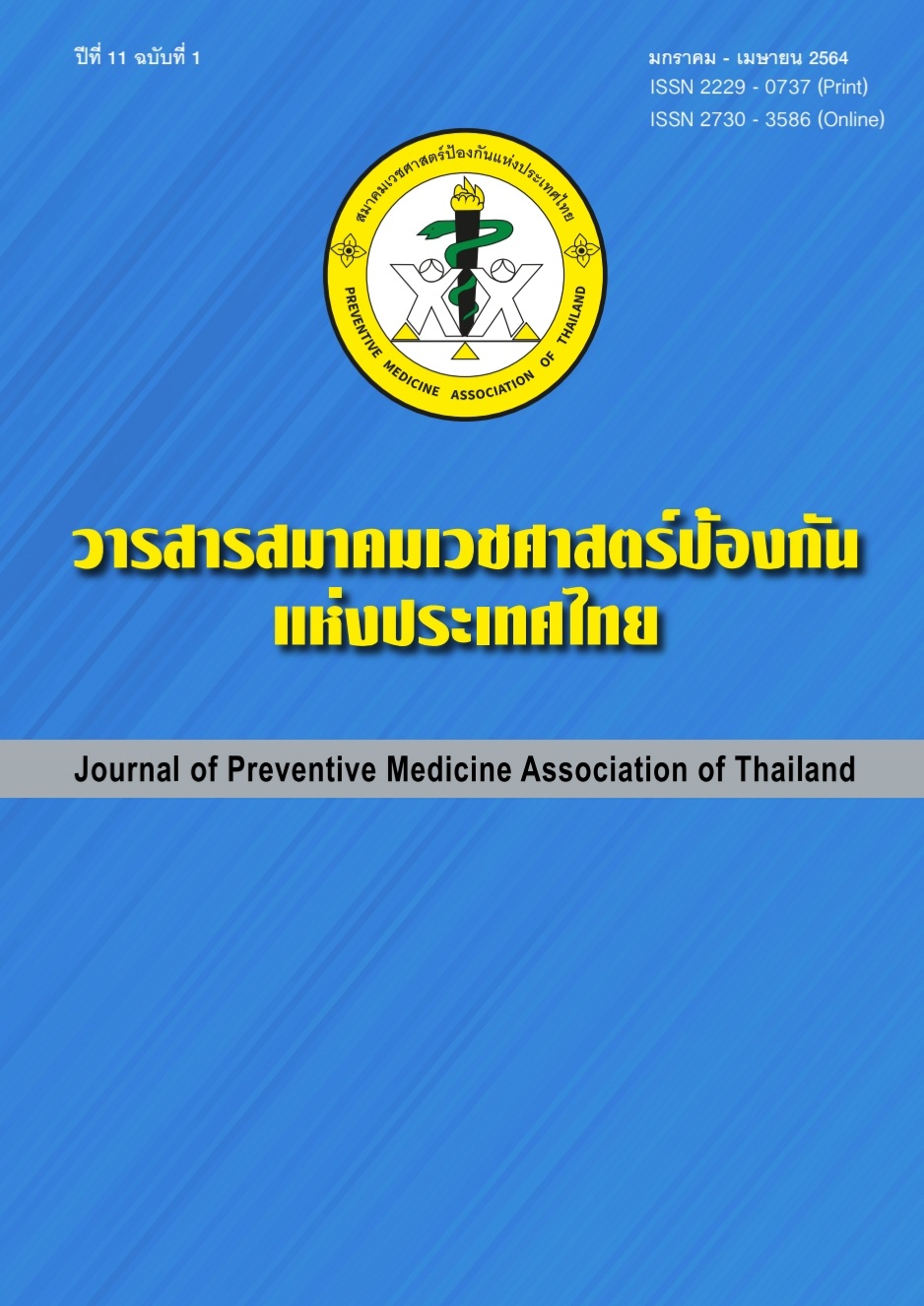Clinical Outcome after Emergency Physicians Reduced Distal Radius Fractures
Keywords:
Fracture distal radius, Emergency Physician, Closed Reduction, Emergency DepartmentAbstract
The study aimed to determine the reduction successfully of distal end radius by emergency physicians. This study was a retrospective and descriptive study from medical record reviews. We included adults older than 18 years presenting to Pra Nakhon Sri Ayutthaya hospital from January 1, 2015, to December 31, 2019, with distal end radius fractures. The primary endpoint was the proportion of successful closed distal end radius fracture reductions in the emergency department, as defined by orthopedic follow-up. The secondary outcomes were to access complications after ED reduction. A total of 40 patients were included in this study. The mean age was 60 years; males comprised 17.5%. A total of 90% had accepted alignment at their first clinic visits, and the overall manipulation rate was 10%. Unscheduled return ED or OPD visits occurred in 17.5%. These involved pain and splint being too tight. Complications after ED reduction were 27.5%. Details of the complications were splint-related problems due to pain 20%, and numbness were 7.5%. None of these return visits were for compartment syndrome or neurovascular compromise. We suggest that emergency physicians provide restorative care for distal end radius fractures (Fernandez classification 1) using the closed reduction technique in the emergency room.
References
คณะอนุกรรมการฝึกอบรมและสอบความรู้ความชำนาญในการประกอบวิชาชีพเวชกรรม สาขาเวชศาสตร์ฉุกเฉิน. เกณฑ์หลักสูตรการฝึกอบรมแพทย์ประจำบ้านเฉพาะทางสาขาเวชศาสตร์ฉุกเฉิน ฉบับปรับปรุงครั้งที่ 4 พ.ศ. 2561 [อินเทอร์เน็ต]. 2561 [เข้าถึงเมื่อ 14 ม.ค.2564]. เข้าถึงได้จาก:https://tcep.or.th/sites/default/files/hlaksuutrewchsaastrchukechin_2561.pdf
Williams DT, Kim HT. wrist and foream. In: Walls RM, Hockberger RS, Gausche-Hill M, editors. Rosen's emergency medicine: concepts and clinical practice. 9th ed. Philadelphia, PA: Elsevier; 2018. p.1027-56.
Mayersak RJ. Orthopedics, Distal radius and ulna fractures. In: Tintinalli JE, Stapczynski JS, Ma OJ, Yealy DM, Meckler GD, Cline DM, et al., editors. Tintinalli's emergency medicine: a comprehensive study guide. 9th ed. New York:McGraw-Hill Education; 2019. p.1805-9.
Chudnofsky CR, Chudnofsky AS. splinting techniques. In: Roberts JR, Custalow CB, Thomsen TW, editors. Roberts and Hedgesû clinical procedures in emergency medicine and acute care. 7th ed. Philadelphia, PA: Elsevier; 2019. p.1027-56.
Reichman EF. Distal radius colles fracture. In: Reichman EF, editor. Reichman's emergency medicine procedures. 3rd ed. Minion Pro by Cenveo; 2019. p.942-6.
Mcqueen MM. Fractures of the distal radius and ulna. In: Court-Brown CM, Heckman JD, Mcqueen MM, Ricci W, Tornetta III P, Mckee MD, editors. Rockwood and Green's fractures in adults. 8th ed. Philadelphia: Wolters Kluwer Health; 2015.p.1057-120.
Wolfe SW. Distal radius fractures. In: Wolfe SW, Hotchkiss RN, Pederson WC, Kozin SH, Cohen MS, editors. Green's operative hand surgery. 7th ed. Philadelphia, PA: Elsevier; 2017. p. 516-87.
Blome AL, Healy ME Wrist. In: Sherman SC, editor. Simon's Emergency Orthopedics, 8e [Internet]. New York, NY: McGraw-Hill Education; 2019 [cited 2021 Jan 14]. Available from: accessemergencymedicine.mhmedical.com/
content.aspx?aid=1154632552
Khan S, Sawyer J, Pershad J. Closed reduction of distal forearm fractures by pediatric emergency physicians: forearm fracture reduction by pediatric EPs. Acad Emerg Med 2010;17:1169-74.
Pershad J, Williams S, Wan J, Sawyer JR. Pediatric distal radial fractures treated by emergency physicians. J Emerg Med 2009;37:341-4.
Malik H, Appelboam A, Taylor G. Collesû type distal radial fractures undergoing manipulation in the ED: a multicentre observational cohort study. Emerg Med J 2020;37:498-501.
Putnam K, Kaye B, Timmons Z, Wade Shrader M, Bulloch B. Success Rates for Reduction of pediatric distal radius and ulna fractures by emergency physicians. Pediatr Emerg Care 2020;36:e56-e60.
Downloads
Published
How to Cite
Issue
Section
License
บทความที่ลงพิมพ์ในวารสารเวชศาสตร์ป้องกันแห่งประเทศไทย ถือเป็นผลงานวิชาการ งานวิจัย วิเคราะห์ วิจารณ์ เป็นความเห็นส่วนตัวของผู้นิพนธ์ กองบรรณาธิการไม่จำเป็นต้องเห็นด้วยเสมอไปและผู้นิพนธ์จะต้องรับผิดชอบต่อบทความของตนเอง






